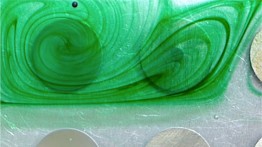Research: Bioengineering

Disks driving precisely controlled and measurable time-varying gyre flows in the lab (Prof. Yecko)
The application of engineering principles and design concepts within biology, directed towards the improvement of medicine, food, fuels, materials and ecosystems, for the betterment of society. This encompasses the design of devices and materials within the biomedical sector, such as medical diagnostics, therapeutics and biocompatible implants, along with areas of biotechnology that includes fields as diverse as synthetic biology, bioreactor design, bioremediation and bioinformatics.
Faculty
- George Delagrammatikas (mechanical engineering)
- Eric Lima (mechanical engineering)
- Ruben Savizky (chemistry)
- Stan Wei (mechanical engineering)
- David Wootton (mechanical engineering)
- Philip Yecko (physics)
- Oliver Medvedik (Sandholm Visiting Assistant Professor of Biology and Bioengineering)
Research Areas
Biomedical Devices, Chronic Intermittent Hypoxia, Open source Community, Fluid Mechanics, Medical Imaging, Modeling RNA folding/unfolding using statistical thermodynamics, Obstructive Sleep Apnea Biomechanics, Tissue Engineering,Robotic Monitoring in Oceans
Labs
- Maurice Kanbar Center for Biomedical Engineering
- Fluid Physics Lab
Programs and Positions for Students




